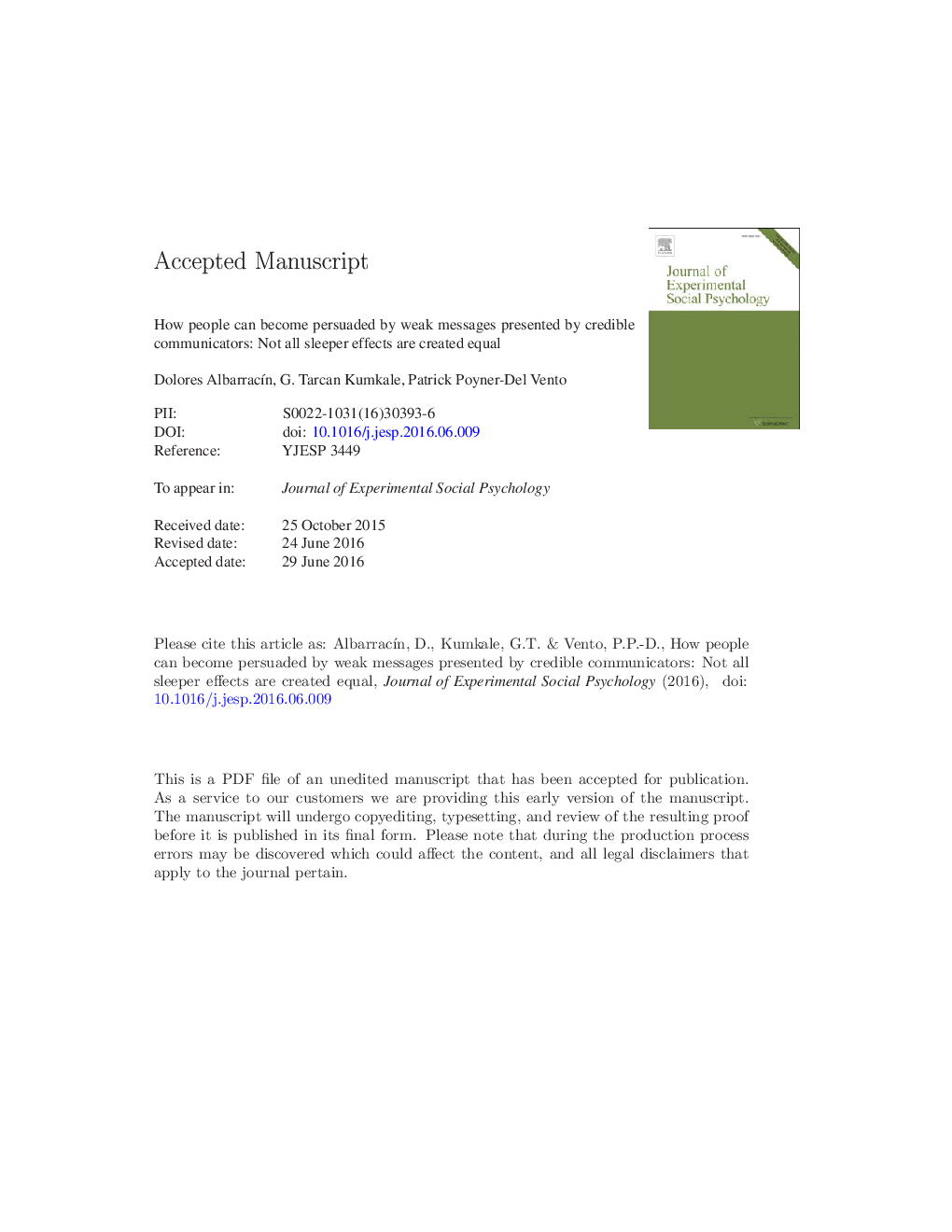| کد مقاله | کد نشریه | سال انتشار | مقاله انگلیسی | نسخه تمام متن |
|---|---|---|---|---|
| 7324378 | 1475855 | 2017 | 42 صفحه PDF | دانلود رایگان |
عنوان انگلیسی مقاله ISI
How people can become persuaded by weak messages presented by credible communicators: Not all sleeper effects are created equal
ترجمه فارسی عنوان
چگونه مردم می توانند توسط پیام های ضعیف ارائه شده توسط طرفداران معتبر متقاعد شوند: همه اثر های خواب آور برابر نیستند
دانلود مقاله + سفارش ترجمه
دانلود مقاله ISI انگلیسی
رایگان برای ایرانیان
کلمات کلیدی
اثر خواب، پایداری نگرش، تضمین ماندگاری، حافظه، تغییر نگرش،
ترجمه چکیده
اثر خواب برای توصیف تغییرات زمانی در اعتقاد به پیام های مرتبط با منابع غیر قابل اعتماد پیشنهاد شده است. تحقیق حاضر نوع جدیدی از اثر خواب را نشان می دهد که افزایش اعتقاد به پیام های ضعیف مرتبط با منابع معتبر را نشان می دهد. این تأثیر منبع، فرض شده است که از حضور در منبع پیام به جای استدلال پیام و بازسازی نگرش های تاخیر در ابتدا بر اساس اطلاعات منبع، حاصل می شود. یافته های سه آزمایش نشان داد که وقتی تمرکز توجه ارتباط دهنده بود، تأثیر خواب برای منبع وجود داشت. به طور خاص، در طول زمان بین پیگیری فوری و پیگیری تاخیر زمانی، زمانی که منابع معتبر به استدلال های ضعیف ارائه دادند، اعتقادات افزایش می یافت. در مقابل، هنگامی که تمرکز توجه استدلال پیام، یک اثر خوابیدن سنتی ظاهر شد. به این ترتیب، هنگامی که استدلال های قوی توسط یک ارتباط دهنده غیرقابل اعتماد ارائه می شود، اطاعت افزایش می یابد. این اثرات به وسیله یادآوری نسبی استدلالها در مقابل ویژگیهای منبع، تکرار شده با موضوعات مختلف پیام و طول تاخیر، متاثر شدند.
موضوعات مرتبط
علوم زیستی و بیوفناوری
علم عصب شناسی
علوم اعصاب رفتاری
چکیده انگلیسی
The sleeper effect has been proposed to describe temporal changes in persuasion for messages associated with noncredible sources. The present research introduces a new kind of sleeper effect denoting increases in persuasion for weak messages associated with credible sources. This effect of the source was hypothesized to derive from attending to the message source rather than the message arguments and reconstructing delayed attitudes primarily on the basis of the source information. Findings from three experiments revealed that when the focus of attention was the communicator, there was a sleeper effect for the source. Specifically, during the time between an immediate follow up and a delayed follow up, persuasion increased when credible sources presented weak arguments. In contrast, when the focus of attention was the message arguments, a traditional sleeper effect emerged. That is, persuasion increased when strong arguments were presented by a noncredible communicator. These effects were mediated by relative recall of arguments versus source attributes and replicated with different message topics and lengths of delay.
ناشر
Database: Elsevier - ScienceDirect (ساینس دایرکت)
Journal: Journal of Experimental Social Psychology - Volume 68, January 2017, Pages 171-180
Journal: Journal of Experimental Social Psychology - Volume 68, January 2017, Pages 171-180
نویسندگان
Dolores AlbarracÃn, G. Tarcan Kumkale, Patrick Poyner-Del Vento,
